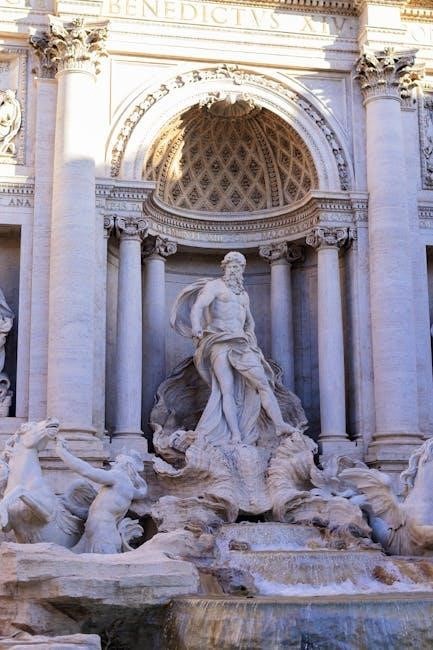The Son of Neptune‚ by Rick Riordan‚ is the second installment in The Heroes of Olympus series‚ continuing the adventures of Percy Jackson and introducing Roman demigods.
1.1 Overview of the Series and Its Significance
The Heroes of Olympus series is a continuation of Rick Riordan’s beloved Percy Jackson and the Olympians‚ expanding the mythological universe by introducing Roman demigods. This series bridges Greek and Roman mythologies‚ offering fresh adventures while maintaining the humor and action fans adore. Its significance lies in its ability to weave together two powerful mythological traditions‚ creating a rich‚ interconnected world that captivates readers of all ages. The series has become a modern classic in young adult literature.
1.2 The Role of “The Son of Neptune” in the Series
The Son of Neptune serves as the second installment in The Heroes of Olympus series‚ bridging the gap between Greek and Roman mythologies. It introduces Roman demigods and their culture‚ expanding the series’ scope. Percy’s amnesia and journey to Camp Jupiter drive the narrative‚ while the quest to free Thanatos and prevent war sets the stage for future books. This novel is pivotal‚ deepening the series’ mythology and preparing readers for the larger prophecy unfolding in subsequent volumes.

Key Characters in “The Son of Neptune”
Percy Jackson‚ the amnesiac son of Neptune‚ joins forces with Hazel Levesque‚ daughter of Pluto‚ and Frank Zhang‚ son of Mars‚ to embark on a perilous quest.
2.1 Percy Jackson: The Demigod Son of Neptune
Percy Jackson‚ the son of Neptune (Poseidon)‚ begins the story with amnesia‚ remembering only the name “Annabeth.” He arrives at Camp Jupiter‚ a Roman demigod camp‚ where he meets new allies. Despite his memory loss‚ Percy’s bravery and loyalty shine as he faces monsters and challenges. His journey reveals fragments of his past‚ connecting his Greek and Roman identities‚ while his leadership skills remain intact‚ making him a pivotal character in the quest.
2.2 Hazel Levesque: The Daughter of Pluto
Hazel Levesque‚ daughter of Pluto‚ brings a unique perspective to the quest. She possesses the ability to control precious gems and metals‚ a gift from her father. Haunted by her past mistakes‚ Hazel struggles with self-doubt but proves herself as a brave and loyal companion. Her connection to the Underworld and her brother‚ Nico‚ adds depth to her character‚ showcasing her resilience and determination to redeem herself and protect her friends‚ making her an integral part of the team.
2.3 Frank Zhang: The Son of Mars
Frank Zhang‚ the son of Mars‚ is a loyal and courageous Roman demigod. Struggling with his identity and the pressures of being a legacy‚ Frank finds his true strength in his bravery and unwavering loyalty to his friends. His unique ability to control fire and his strategic thinking make him invaluable to the quest. Frank’s journey is one of self-discovery and growth‚ as he learns to embrace his heritage and find his place among both Roman and Greek demigods‚ proving himself as a true hero.

Plot Summary and Quest
Percy Jackson‚ suffering from amnesia‚ arrives at Camp Jupiter‚ where he meets Hazel and Frank. Together‚ they embark on a perilous quest to the land beyond the gods‚ facing monstrous challenges to free Thanatos and prevent a catastrophic war.
3.1 Percy’s Amnesia and Arrival at Camp Jupiter
Percy Jackson‚ suffering from amnesia‚ arrives at Camp Jupiter with no memories except Annabeth’s name. Trained by the wolf Lupa‚ he battles gorgons and gains the camp’s cautious acceptance. His arrival sparks curiosity and suspicion among Roman demigods‚ who are wary of Greek heroes. Percy’s identity as the son of Neptune slowly unravels‚ setting the stage for his quest alongside Hazel and Frank.
3.2 The Journey to the Land Beyond the Gods
Percy‚ Hazel‚ and Frank embark on a perilous quest to the Land Beyond the Gods‚ a treacherous region where Roman and Greek mythologies intertwine. They face formidable challenges‚ including encounters with Phineas‚ who holds Ella captive‚ and the relentless pursuit by gorgons. The trio must rely on their combined strengths and clever strategies to overcome obstacles. Their journey is fraught with danger‚ yet it strengthens their bond and prepares them for the prophecy’s fulfillment.

Themes and Symbolism
The novel explores the clash between Greek and Roman mythologies‚ symbolizing unity through diversity. Percy’s journey reflects the struggle to bridge two worlds‚ fostering cooperation and understanding.
4.1 The Struggle with Identity and Memory
Percy Jackson’s amnesia in The Son of Neptune exemplifies the struggle with identity and memory. His loss of recollection creates confusion about his past‚ amplifying his internal conflict. The Roman camp’s unfamiliar culture clashes with his Greek upbringing‚ deepening his identity crisis. This theme highlights the importance of memory in shaping self-perception and the challenges of navigating a fragmented identity. Percy’s journey becomes as much about reclaiming his memories as it is about completing his quest.
4.2 Friendship and Loyalty in the Face of Danger
In The Son of Neptune‚ the bond between Percy‚ Hazel‚ and Frank highlights the power of friendship and loyalty. Despite Percy’s amnesia and the trio’s differing backgrounds‚ they trust and rely on one another‚ facing immense dangers together. Their shared quest to the Land Beyond the Gods tests their commitment‚ as they confront monsters‚ traps‚ and personal fears. Through their unwavering loyalty‚ they prove that true friendship can overcome even the most daunting challenges‚ reinforcing the novel’s theme of unity in adversity.

The Roman Demigod Camp: Camp Jupiter
Camp Jupiter is the Roman demigod sanctuary‚ where Percy arrives with amnesia. It’s a place of Roman traditions and rigorous training for demigods‚ vital for their quests.
5.1 Culture and Differences from Camp Half-Blood
Camp Jupiter reflects Roman traditions‚ emphasizing discipline‚ strategy‚ and military prowess. Unlike Camp Half-Blood‚ it features Roman architecture‚ such as temples and forums‚ and prioritizes collective strength. The camp’s rigid hierarchy and formal rituals contrast with the more relaxed‚ individualistic atmosphere of its Greek counterpart. Roman demigods focus on honor and loyalty to the state‚ while Greek demigods often emphasize personal heroism. This cultural divide highlights the unique identities of both camps‚ rooted in their mythological origins.

Mythological Connections
The Son of Neptune seamlessly blends Greek and Roman mythologies‚ exploring the shared history of gods like Neptune and Poseidon‚ while introducing Roman demigod traditions and lore.
6.1 Greek and Roman Mythology in the Story
The Son of Neptune masterfully intertwines Greek and Roman mythologies‚ showcasing the shared origins of gods like Neptune and Poseidon‚ while highlighting their distinct Roman interpretations. The story introduces Roman demigod culture‚ contrasting it with the Greek traditions from Camp Half-Blood. Mythological creatures and figures‚ such as Gorgons and Cyclopes‚ are reimagined through a Roman lens‚ enriching the narrative with diverse lore. This blend creates a unique tapestry that deepens the series’ mythological depth and appeal.

Reception and Impact
The Son of Neptune received widespread acclaim for its engaging plot and character development‚ resonating with fans and critics alike‚ solidifying its place in young adult literature.
7.1 Release and Popularity of the Book
The Son of Neptune was released on October 4‚ 2011‚ and instantly became a bestseller‚ debuting at number one on the New York Times bestseller list. Fans eagerly anticipated the continuation of Percy Jackson’s story‚ and the book’s popularity soared due to its engaging plot and character development. Its success solidified the Heroes of Olympus series as a favorite among young adult readers‚ further cementing Rick Riordan’s reputation as a master of mythological storytelling.
7.2 Fan and Critical Response
The Son of Neptune received widespread acclaim from both fans and critics‚ praised for its compelling narrative and character development. Fans appreciated the introduction of Roman demigods and the deeper exploration of Percy’s identity. Critics highlighted Riordan’s ability to weave Greek and Roman mythologies seamlessly‚ creating a rich and immersive world. The book’s intricate plot twists and emotional depth resonated with readers‚ solidifying its place as a standout in the series and further establishing Riordan’s mastery of young adult fantasy literature.
The Son of Neptune masterfully continues Percy’s journey‚ blending Roman mythology with beloved characters. Its fresh themes and gripping plot ensure lasting appeal for readers worldwide.
8.1 The Significance of “The Son of Neptune” in the Series
The Son of Neptune bridges Greek and Roman mythologies‚ expanding the demigod universe. It introduces Camp Jupiter and Roman demigods‚ enriching the series’ cultural depth. Percy’s amnesia adds emotional complexity‚ while the quest to free Thanatos highlights the stakes. The book sets the stage for future collaborations between Greek and Roman demigods‚ making it a pivotal installment in The Heroes of Olympus series‚ deepening character development and series continuity.
8;2 Its Appeal to Readers
The Son of Neptune captivates readers with its blend of Greek and Roman mythology‚ relatable characters‚ and high-stakes adventures. Percy’s amnesia and the introduction of Roman demigods add fresh dynamics‚ while themes of loyalty and identity resonate deeply. The book’s fast-paced action‚ humor‚ and emotional depth make it a favorite among fans of Rick Riordan’s work. Its ability to expand the demigod universe while maintaining series continuity ensures it appeals to both longtime fans and new readers alike.
